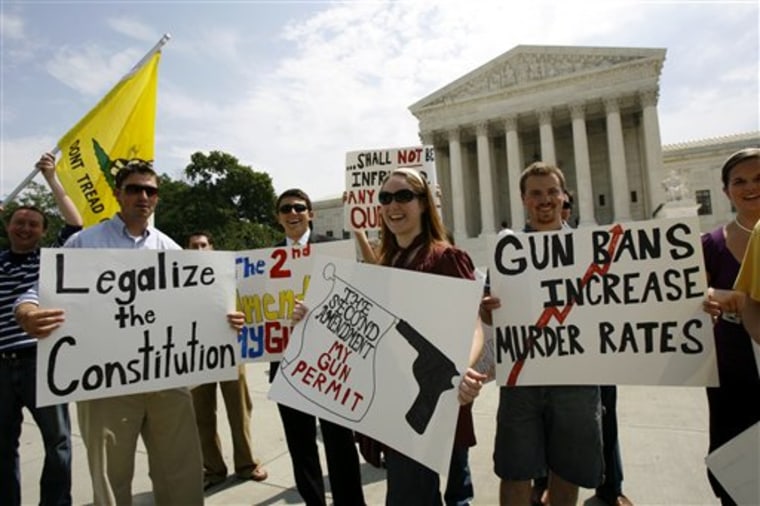Twice convicted of felonies, James Francis Barton Jr. faces charges of violating a federal law barring felons from owning guns after police found seven pistols, three shotguns and five rifles at his home south of Pittsburgh.
As a defense, Barton and several other defendants in federal gun cases argue that last month's Supreme Court ruling allows them to keep loaded handguns at home for self-defense.
"Felons, such as Barton, have the need and the right to protect themselves and their families by keeping firearms in their home," says David Chontos, Barton's court-appointed lawyer.
Chontos and other criminal defense lawyers say the high court's decision means federal laws designed to keep guns out of the hands of people convicted of felonies and crimes of domestic violence are unconstitutional as long as the weapons are needed for self-defense.
So far, federal judges uniformly have agreed these restrictions are unchanged by the Supreme Court's landmark interpretation of the Second Amendment.
"The line I'm proposing, at the home, is entirely consistent" with the Supreme Court ruling, said Chontos, a lawyer in Turtle Creek, Pa. A court hearing on the issue is scheduled for late July.
New angle of attack
The legal attacks by Chontos and other criminal defense lawyers are separate from civil lawsuits by the National Rifle Association and others challenging handgun bans in Chicago and its suburbs as well as a total ban on guns in public housing units in San Francisco.
People on both sides of the gun control issue say they expect numerous attacks against local, state and federal laws based on the high court's 5-4 ruling that struck down the District of Columbia's ban on handguns. The opinion by Justice Antonin Scalia also suggested, however, that many gun control measures could remain in place.
Denis Henigan, vice president for law and policy at the Brady Center to Prevent Gun Violence, said Scalia essentially was reassuring people that the laws keeping guns from felons and people with mental illness and out of government buildings and schools would withstand challenges. But Henigan said he is not surprised by felons pressing for gun-ownership rights.
"The court has cast us into uncharted waters here. There is no question about that," Henigan said.
"There is now uncertainty where there was none before," he said. "Gun laws were routinely upheld and they were considered policy issues to be decided by legislatures."
At the Justice Department, spokesman Erik Ablin said the agency's lawyers "will continue to defend vigorously the constitutionality, under the Second Amendment, of all federal firearms laws and will respond to particular challenges in court."
City bans most vulnerable
Cities' outright bans on handguns probably are the most vulnerable laws following the Supreme Court ruling. Many lawyers and Second Amendment experts believe that restrictions on gun ownership in public housing also will be difficult to defend.
The question for courts will be whether the government has more power when it acts as a landlord, as it does in public housing, than in general.
"I think there's a very substantial chance that these kinds of ordinances will be struck down because they are aimed at people who have shown no reason to be viewed as untrustworthy," said Eugene Volokh, a law professor at the University of California, Los Angeles, who has written about gun rights.
San Francisco Mayor Gavin Newsom has said the city will defend the policy as good for public safety. "Is there anyone out there who really believes that we need more guns in public housing?" Newsom said when the suit was filed a day after the Supreme Court ruled on Washington's handgun ban.
In the District of Columbia, the city housing authority is considering whether its prohibition on firearms in public housing can survive the court ruling, spokeswoman Dena Michaelson said.
But Volokh and some gun rights proponents said people convicted of crimes are less likely to succeed in their challenges.
"Many felons may need self defense more than you and I, but the government has extra justification for limiting that right because they have proven themselves to be untrustworthy," Volokh said.
A gun for Scooter Libby?
Judges may find it harder to resolve cases in which nonviolent criminals, particularly those whose only offense happened long ago, are charged with gun possession.
"Do you think Scooter Libby should have a gun?" asked Douglas Berman, a law professor at Ohio State University who says the ruling will complicate the work of the courts, prosecutors and police. He was referring to former White House aide I. Lewis "Scooter" Libby, who was convicted of perjury, obstruction and lying to the FBI in the CIA leak investigation.
A more plausible case for being allowed a gun might be made by someone now in his 50s or 60s who was convicted as a teenager of taking a car for a joyride, said Stephen P. Halbrook, a gun rights supporter and lawyer. "You might have a court look at that differently," Halbrook said.
The Supreme Court has a case on its calendar for the fall that could indicate whether the justices are inclined to expand their ruling.
In United States v. Hayes, the government is asking the court to reinstate a conviction for possession of a gun for someone previously convicted of a domestic violence crime. In 1994, Randy Hayes received a year of probation after pleading guilty to beating his wife.
The 4th U.S. Circuit Court of Appeals overturned the conviction because the West Virginia law Hayes violated does not specifically deal with domestic violence crimes. The question for the high court, then, is a technical one: whether the law has to include domestic violence to be used in the future to prevent someone from owning guns?
Advocates on both sides of the gun control debate will be watching closely to see whether the court's D.C. decision is relevant to the Hayes case and, if so, how.
